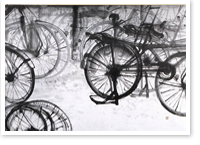
"Without choice there are no mistakes; without mistakes there is no learning, and without learning there is no development." - R. L. Ackoff
|
|
REASEARCH
Environmental Justice and Policy
Environmental injustice as a research topic has intrigued me since I joined Arizona State University (ASU) in 2007. Over the course of an eight-year collaboration, my colleagues (Heather Campbell at the Claremont Graduate University and Adam Eckerd at Indiana University-Purdue University Indianapolis) and I have been successful in showing the utility of agent-based modeling approach for urban and environmental issues. In 2015, we wrote the book, Rethinking Environmental Justice in Sustainable Cities: Insights from Agent-Based Modeling. In this book, we showed how and why environmental injustice can be understood as an emergent phenomenon of dynamic urban systems. This book is a rare, agent-based modeling application for policy analysis grounded well in theory. The book has inspired my students and future scholars who wish to study environmental justice and other public policy topics through the lens of complex adaptive systems. Building upon this work and experience in environmental justice, we now are developing papers and another book proposal on brownfield cleanup.
Since Fall 2017, I have led a separate research group on environmental justice and policy with two other colleagues (Elizabeth Corley and Joanna Lucio) in the ASU School of Public Affairs (SPA: https://sites.google.com/view/ejpi/home). This group has grown and now includes four faculty members, two post-doctoral instructors, two visiting scholars, two doctoral students, and two talented high school students who found me because of their interest in environmental justice and policy. My colleagues and I also have advised graduate and Barrett honors undergraduate students. This year we received a $30,000 seed grant from the College of Public Service and Community Solutions in ASU. Our first paper on conceptualizing the quality of urban parks was accepted recently in Environmental Justice, and our research group is working on several papers on parks and greenspaces from an environmental justice perspective.
Infectious Diseases and Response
As a policy analyst, my five years of experience at the Ohio Department of Health has shaped my interest in public health and social welfare problems. Since I joined ASU, my early interest in supporting Ohio Medicaid and WIC decisions expanded to studying emerging infectious disease outbreaks, such as that of H1N1 in 2009. In collaboration with an epidemiologist, applied mathematician, and practitioners at the Arizona Department of Health Services, my work in this research area focused on understanding the way the Arizona public perceives the risk of the new disease and is prepared for it, as well as ways to support critical government decisions during the outbreak, such as school closures and health professional training, using computer simulations.
In Fall 2015, I was asked to join an interdisciplinary research team at Hanyang University in South Korea. For this opportunity, I proposed to examine the way in which inter-organizational emergency response networks formed and evolved during the Middle East Respiratory Syndrome outbreak in Seoul in May-June 2015. In August 2018, the team was selected as the recipient of a ten million-dollar, seven-year grant from the Korea National Science Foundation. I am collaborating with other members of the university's engineering school who are developing a tool that helps us mine text-based media data to construct emergency response networks. Over the next several years, I will devote time and energy to this project in collaboration with researchers in the US and Asia. Interdisciplinary research has been the vehicle through which I have explored and understood the value of systems thinking in addressing policy and management problems.
|



